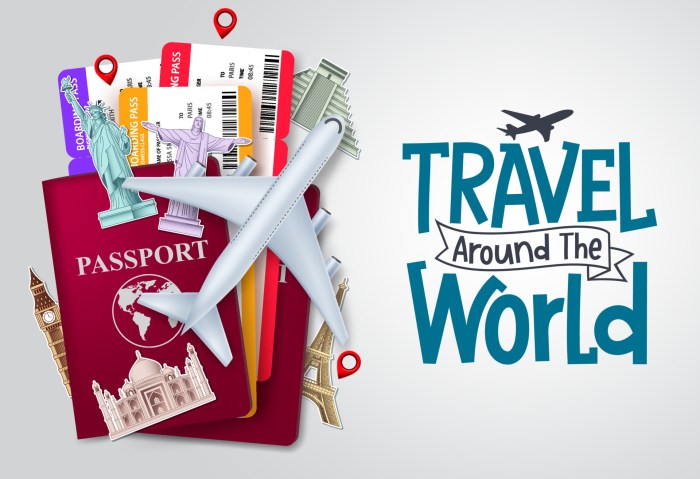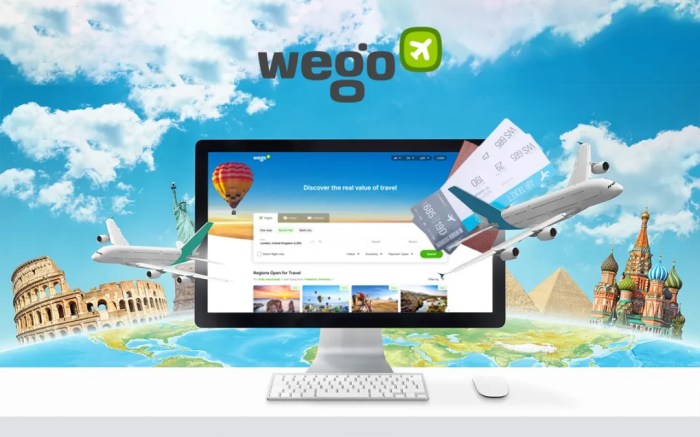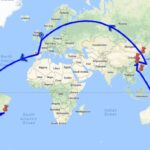Ticket To Travel Around The World: Imagine yourself traversing continents, immersing in vibrant cultures, and creating memories that will last a lifetime. This isn’t just a dream; it’s a meticulously planned adventure waiting to unfold. This comprehensive guide equips you with the knowledge and strategies to make your round-the-world journey a reality, from meticulous budgeting and visa acquisition to navigating cultural nuances and capturing unforgettable moments.
Prepare to embark on the trip of a lifetime.
We’ll cover everything from crafting a detailed itinerary and choosing the perfect travel style to understanding visa requirements, managing your finances, and prioritizing safety and health. Learn how to optimize your budget, select the most efficient transportation methods, and navigate diverse cultural landscapes with grace and respect. This isn’t just about ticking off destinations; it’s about personal growth, cultural understanding, and the creation of a truly transformative experience.
Safety and Health Precautions: Ticket To Travel Around The World

International travel offers unparalleled experiences, but neglecting safety and health precautions can quickly turn an adventure into a nightmare. Thorough preparation is key to minimizing risks and maximizing enjoyment. Understanding potential health threats, taking appropriate preventative measures, and prioritizing personal security are paramount for a successful trip.
Potential Health Risks and Preventative Measures
Various health risks are associated with international travel, ranging from minor inconveniences to serious illnesses. These risks depend heavily on your destination and the activities you plan. Foodborne illnesses are common, stemming from contaminated food or water. Mosquito-borne diseases like malaria, dengue fever, and Zika virus are prevalent in many tropical and subtropical regions. Respiratory infections, such as influenza, are also a concern, especially in crowded areas.
To mitigate these risks, practice diligent hand hygiene, drink only bottled or purified water, avoid consuming uncooked or undercooked food, and use insect repellent containing DEET. Consult your doctor about necessary medications, such as anti-malarial drugs, if traveling to high-risk areas. Consider travel insurance that covers medical emergencies and evacuations.
Travel Vaccinations and Medical Consultations
Travel vaccinations are crucial for protecting yourself against preventable diseases. The specific vaccines you need will depend on your destination and the duration of your trip. Some vaccines require multiple doses administered weeks or months apart, so planning ahead is essential. A pre-travel consultation with your doctor or a travel clinic is strongly recommended. They can assess your individual risk profile, advise on necessary vaccinations, and provide information on other preventative measures, including medications for altitude sickness or diarrhea.
They can also provide you with a detailed health record for reference during your trip. Don’t underestimate the importance of this consultation; it’s a proactive step towards a healthier and safer journey.
Safety Tips for Travelers
Personal security should be a top priority while traveling internationally. Before your trip, research your destination’s safety guidelines and potential risks. Keep your passport, money, and other valuables secure, preferably using a money belt or hidden pouch. Be aware of your surroundings, avoid walking alone at night in unfamiliar areas, and trust your instincts – if a situation feels unsafe, remove yourself from it.
Learn basic phrases in the local language to aid communication. Photocopy important documents and keep a separate copy from the originals. Inform someone reliable of your itinerary and expected return date. Avoid displaying expensive jewelry or electronics openly. Be cautious of scams and unsolicited offers.
Staying Healthy and Managing Potential Illnesses
Maintaining good health while traveling requires proactive measures. Eat a balanced diet, get enough sleep, and stay hydrated. Regular exercise can help boost your immune system. Pack a small first-aid kit containing essential medications, such as pain relievers, anti-diarrheal medication, and antiseptic wipes. If you become ill, seek medical attention promptly.
Carry a list of emergency contacts, including your embassy or consulate. Understand the local healthcare system and be prepared for potential language barriers. Remember that early intervention is crucial in managing any illness effectively and preventing complications. Staying informed and prepared will greatly increase your chances of a healthy and safe trip.
Cultural Sensitivity and Etiquette

Navigating the world successfully isn’t just about ticking off landmarks; it’s about understanding and respecting the diverse tapestry of human cultures. Ignoring local customs can lead to misunderstandings, offense, and even jeopardize your trip. Cultural sensitivity is paramount for a truly enriching and positive travel experience. This section will equip you with the knowledge to navigate cultural nuances with grace and respect.Cultural differences significantly impact communication and interaction.
What might be considered polite in one culture could be deeply offensive in another. These differences aren’t merely about superficial behaviors; they reflect deeply ingrained values, beliefs, and social norms. Understanding these underlying principles allows for more meaningful connections and avoids potentially embarrassing or harmful situations.
Examples of Cultural Etiquette in Various Regions
Understanding appropriate behavior varies dramatically across the globe. For instance, in many Asian countries, direct eye contact can be considered disrespectful, while in Western cultures, it’s often seen as a sign of engagement and honesty. Similarly, personal space preferences differ widely. In some cultures, close proximity during conversations is the norm, while others maintain a greater distance.
In some Middle Eastern and South Asian cultures, using your left hand for eating or handing objects is considered unclean. In Japan, slurping noodles is a sign of appreciation, while doing so in some Western cultures might be seen as uncouth. These are just a few examples highlighting the importance of pre-trip research.
Impact of Cultural Differences on Communication and Interaction
Misunderstandings stemming from cultural differences are common. Direct communication styles prevalent in some Western cultures can be perceived as aggressive or rude in cultures that prioritize indirect communication. Similarly, differing interpretations of nonverbal cues, such as gestures and facial expressions, can lead to misinterpretations and strained relationships. The use of humor, too, varies widely; what’s considered funny in one culture might be offensive in another.
Effective cross-cultural communication requires empathy, active listening, and a willingness to adapt your communication style to the context. Learning a few basic phrases in the local language, even if it’s just “hello” and “thank you,” can go a long way in demonstrating respect and building rapport.
Resources for Learning About Cultural Norms and Customs, Ticket To Travel Around The World
Before embarking on your global adventure, equip yourself with the necessary knowledge to navigate cultural landscapes effectively.Prior to your trip, dedicate time to researching the customs and traditions of your destination. Numerous resources are available to help you prepare.
- Guidebooks: Reputable guidebooks often include sections on cultural etiquette and customs.
- Online Resources: Websites like Culture Crossing and Kwintessential provide detailed information on cultural norms in various countries.
- Embassy Websites: Check the website of the country’s embassy or consulate for travel advisories and information on local customs.
- Books and Documentaries: Explore books and documentaries focusing on the culture and history of your destination.
- Blogs and Travel Forums: Read blogs and travel forums for firsthand accounts and tips from other travelers.
Your Ticket To Travel Around The World is more than just a passport; it’s a key to unlocking personal growth, broadening your horizons, and creating memories that will shape you forever. By meticulously planning your journey, understanding the practicalities, and embracing the cultural richness of different nations, you can transform this dream into an unforgettable reality. Remember, the world awaits – are you ready to explore it?

